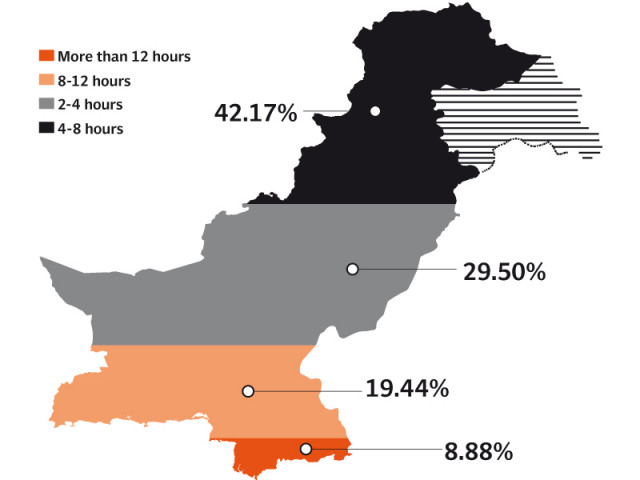Power outages sap Pakistan’s productivity
Survey shows 91% of professionals report productivity losses at the workplace due to load-shedding.

Power outages sap Pakistan’s productivity
When the lights go out, so does our productivity.
According to a recent survey by Rozee.pk, 42% of employed professionals in Pakistan face four to eight hours of load-shedding at the workplace every day.
While most offices have back up power, an astonishing 9% of the employed population is left idle with no backup power during the load-shedding hours.
Breakdowns
In the survey conducted between July 4 and 10, 2012, 76% of the respondents said that power outages have significantly increased during the last few months.
The outages are ubiquitous – 41% of the respondents face 8 to 12 hours of load-shedding at home per day while 42% of employed professional face 4 to 8 hours of load-shedding at workplace every day.
Peshawar ranked as the worst city vis-à-vis power outages with 47% of the city’s residents facing load-shedding for more than 12 hours a day. Karachi was least-affected among other cities with almost half the respondents from the city facing between 4 and 8 hours of load-shedding per day.
Back up
To copy with the frequent and chronic outages, Pakistanis resort to UPS (uninterrupted power supply) and generators – 39% of survey’s respondents use UPS, 13% use a generator, and 6% use both. That leaves a whopping 42% of Pakistanis with no back up power facility at home.
At offices though, 51% of working professionals report to have continuous power through generators, 24% use both generator and UPS whereas 9% have no backup power supply to carry out their tasks.
That’s 9% of the employed workforce sitting idle at work everyday when the power goes out, for hours.
Productivity loss
With 8 hours of outages on average at home, and no power back up facility, there is bound to be an impact on productivity.
91% of professionals report productivity losses at the workplace with almost two-thirds of employed respondents professing ‘significant’ productivity loss in their work routine due to excessive load-shedding at home; only 8% feel their work productivity isn’t affected by load-shedding at home.
It also comes as no shock that faced with chronic and persistent load-shedding at home, 67% of the employed sector feels tired and lazy at work the next day.
Who to blame
Almost four-fifths of respondents blamed President Zardari for the load-shedding while 40% of the respondents also blamed the ruling Pakistan Peoples Party. A mere 18% blamed themselves. The survey was answered by over 3,000 respondents from 193 cities across Pakistan.
Published in The Express Tribune, August 10th, 2012.



















COMMENTS
Comments are moderated and generally will be posted if they are on-topic and not abusive.
For more information, please see our Comments FAQ